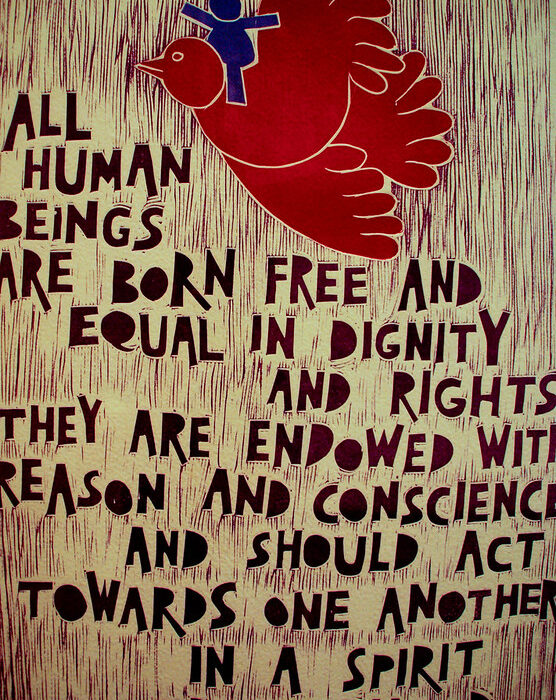
In the fight for advocacy for deaf people, let’s focus on human rights, which are a non-negotiable thing for everyone on Earth. The deaf community is a minority and culturally distinctive group in society. They have their language and operate autonomously like any other ethnic group. Yet, it has been a struggle to be recognized as such by the rest of society.
So, who exactly is fighting for the deaf community? Government leaders? Religious leaders? In times when humanity needs one another the most, that’s when the people come together. Not necessarily the ones with the most power, but the ones with less, especially in the name of religion.
Let’s dive deeper into how faith is advancing human rights for deaf individuals.
The Importance of Human Rights
What are human rights?
The United Nations defines it as our right to exist, regardless of race, gender, nationality, ethnicity, language, or religion. It also means access to adequate education, shelter, work, healthcare, and freedom.
The UN adopted a declaration of rights for all people in 1948, establishing that we all have unalienable rights. However, not all countries around the world have adopted them. The Declaration of Rights is a guideline for creating a general value system.
Namely, some former Soviet nations do not follow the Declaration of Rights, and neither do countries in the Middle East like Saudi Arabia. Although, there have been compromises made for Muslim-majority nations that reject the idea of the declaration. It has been revised into a new document to reflect Sharia law.
What is the importance of human rights in our society? Because we are all human beings. That brings a sense of morality into the mix. Most people want to have good morals and don’t want to cause harm to others. Some governments don’t necessarily choose to defend the life of everyone, but with morality standards in place, they have to obey.
Another question poses how can we vouch for the more vulnerable communities? Even the government tries to overstep and goes on a power trip. As humans, we also have a mutual responsibility for one another. That means taking a stand with these vulnerable communities that don’t have the accessibility or capacity to defend themselves.
How Does Religion View the Human Race
Religion is a sacred space for people to feel safe and lead meaningful life. It stands on the idea of acceptance no matter where you come from. Most religions also believe that humans have a moral capacity with free will.
For Western religions, mainly Christianity, all humans have a highly divine value and are unique because they are granted existence through the eyes of God. This belief existed before social values like economic status and preached that all humans are equal.
Human Rights and The Deaf Community
The one thing that comes to mind with human rights and faith is the freedom of religion. A basic human right is to practice whatever religion you want. This right doesn’t just apply to the practice of religion. It’s also accessibility, which minority communities like the deaf don’t receive much of. Not giving the deaf community a choice of where they practice their faith is denying them human rights.
The human rights of deaf people begin with the availability of Sign Language. But the Catholic church often has the wrong idea but with good intentions. In the 2009 New Theology Review, Min Seo Park, the first deaf, ordained Catholic priest, explains that the current leaders in the church see deaf people as disabled.
The church has failed to see the deaf community as culturally distinct. They see them as people who need pity, which is quite the opposite of what deaf people want. This perspective in itself is disempowering and patronizing. It denies the right of deaf people who want faith in their life recognition as a culturally diverse community by the church.
Rights to Language Accessibility
Language is what people use to understand the world and one another. It is a deaf person’s fundamental right to use the language in their community and use it to some extent outside of it. Not to mention, it is also a means for participating in society. In this case, that includes practicing religion. Since the hearing community didn’t want to step up and provide enough religious support, the deaf community took matters into their own hands.
What better way to come together in the name of humanity than by forming micro ecclesial communities? The Catholic deaf communities have come together on shared life and linguistic experiences to form local churches. But it is equally important to have deaf people trained as religious leaders to provide a unique experience for the deaf participants.
The Cursillo Movement for Empowerment
The Cursillo Movement started in 1970 to give short religious courses held on the weekends (Cursillo is the Spanish word for short courses) in American Sign Language. In this way, deaf Catholics can understand the word of God in their mother tongue and grow closer to their faith. It also includes training to inspire deaf people to serve their religious community.
The government or religious leaders don’t necessarily need to be the saviors of the world. That is something to remember in the discussion of human rights. The right to exist as a person and have the opportunities to thrive. Humans as a species coming together to support one another to live a fruitful life is what we were designed to do. It was always about the greater community from the beginning.
Religion has always stood firmly on the fact that human life is meaningful in the eyes of its creator. Religion and human rights coincide in the belief that every person has the right to access the same things, specifically freedom of religion. No matter their background or status.
To learn more about how Unspoken Language Services is advocating for the deaf community, visit https://www.unspokenasl.com/
Thumbnail Photo Credit to: “Human Right” by Riacale

